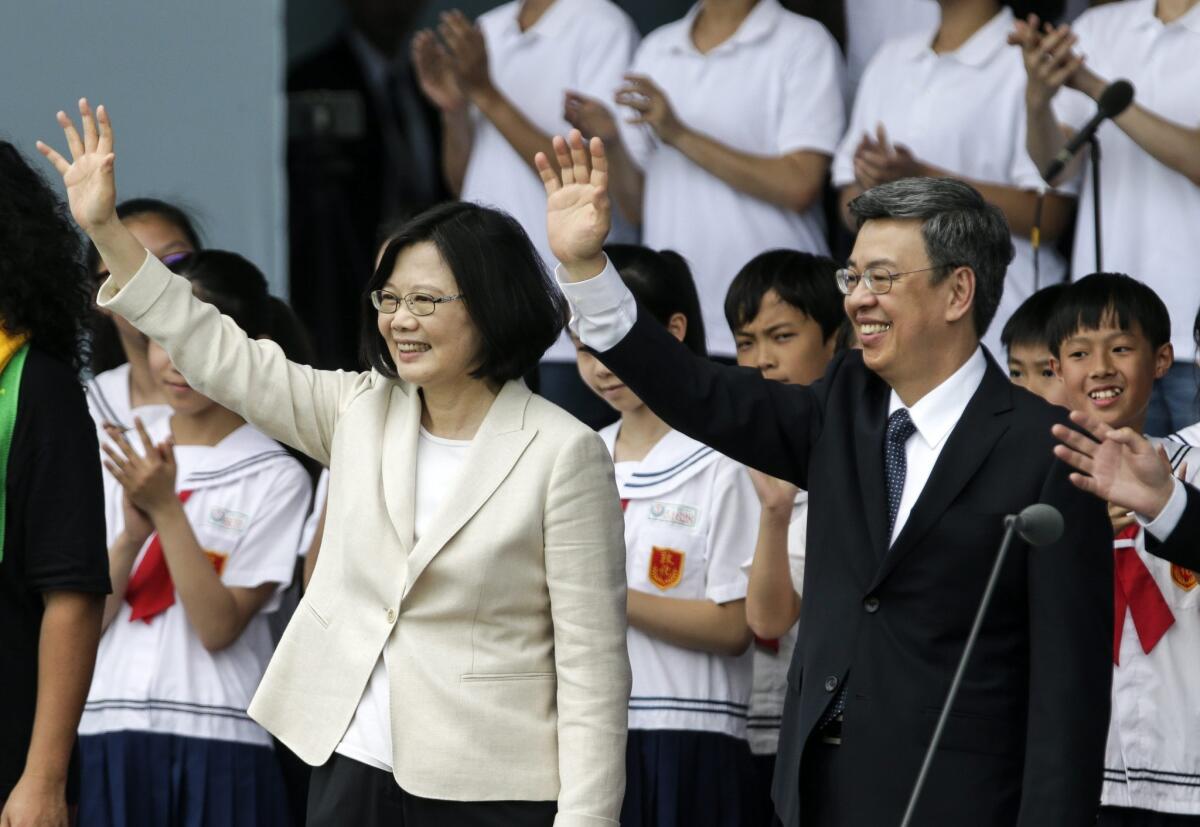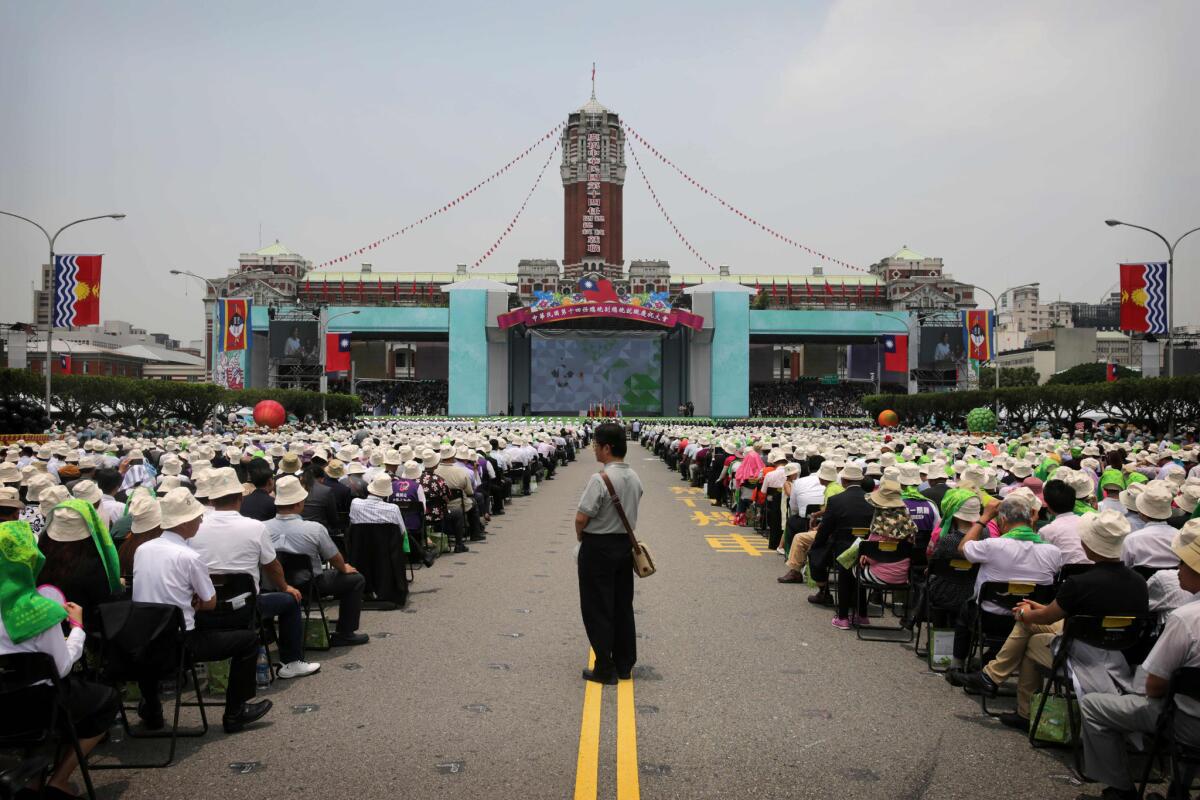Taiwanâs new president says sheâs willing to talk to Beijing

Reporting from TAIPEI, Taiwan â Taiwanâs new president, Tsai Ing-wen, expressed a willingness to talk to Beijing as she took office Friday, but she laid out no grand framework for handling relations between the two rivals and instead emphasized her determination to focus on her islandâs economy and make it less reliant on trade with China.
Elected in a landslide in January, Tsai is the islandâs first female leader, and only its second from the Democratic Progressive Party â many of whose members advocate formal independence from China. She delivered her inaugural address to an enthusiastic group of about 30,000 invitees in the streets outside the presidential offices in Taipei after a morning of performances that emphasized Taiwanâs farmers, youth and minorities. Members of one indigenous troupe sang their own version of the national anthem, spotlighting Taiwanâs Austronesian, rather than Chinese, heritage.
China is keeping a wary eye on Tsai. Taiwan split from the mainland in 1949 after Chinaâs civil war, and has been selfâruled ever since, with its sovereign status in a kind of limbo. Taiwanâs constitution binds the two sides, but public opinion polls show most Taiwanese prefer autonomy. Beijing, though, insists that Taiwan is still part of China. A declaration of formal independence by Taiwan would be a red line for China, but Tsai says she wonât cross it.
âThe two governing bodies across the Strait must set aside the baggage of history and engage in positive dialogue, for the benefit of the people on both sides,â Tsai, a 59-year-old law scholar said, referring to Taiwan and China. âWe will also work to maintain the existing mechanisms for dialogue and communication across the Taiwan Strait.â
The two governing bodies across the Strait must set aside the baggage of history and engage in positive dialogue.
— President Tsai Ing-wen, referring to Taiwan and China
Tsaiâs predecessor, Ma Ying-jeou of the Nationalist Party, pursued new trade and tourism pacts with China after taking office in 2008, winning appreciation from Beijing. Exports to China surged under Ma over the last eight years, to a record two-way trade total of $130 billion in 2014. The two sides signed 23 deals aimed at helping Taiwanâs economy, but many Taiwanese feel theyâre now too dependent on their giant neighbor, and that the benefits have not trickled down to the lower levels of society. Economic growth slowed last year.
Tsai said Friday that Taiwan should rely more on trade with other countries, outlining a multi-layered plan to turn the stalling half-trillion-dollar economy around.
âWe will also promote a âNew Southbound Policyâ in order to elevate the scope and diversity of our external economy, and to bid farewell to our past over-reliance on a single market,â Tsai said.
That means âbroader exchangesâ with Southeast Asia and India, she said.
Taiwan is looking to expand its political role in Asia as well, she said, noting that the region âis becoming increasingly complex.â As for disputed maritime claims involving countries from Japan to Indonesia in the South China Sea and elsewhere, Tsai proposed laying aside territorial claims and exploiting natural resources in the area together.
âWe will establish mechanisms for intensive and routine communications with all parties involved, and exchange views at all times to prevent misjudgment, establish mutual trust and effectively resolve disputes,â she said.

Invited guests watch and listen as new Taiwanese President Tsai Ing-wen gives her inauguration speech in Taipei on May 20.
China actively works to block its 170 formal diplomatic allies from engaging with Taiwanese officials in regional disputes. But during Maâs administration, Beijing got out of Taiwanâs way occasionally, which allowed the island to sign two free-trade agreements in the region.
Taiwanese political scientists said they believed Beijing would react coolly to Tsaiâs remarks but not fume or make threats in the short term. But if Tsai doesnât follow up with a more concrete proposal to hold dialogue, analysts say, China will likely step up pressure by curtailing economic benefits built up over the last eight years.
âChina has already made it pretty clear what it really wants, and it wants to hear more about the relationship between China and Taiwan,â said Liu Yi-jiun, public affairs professor at Fo Guang University in Taiwan. âItâs non-avoidable that Tsai has to address this to minimize political uncertainty.â
Any talks hinge on whatâs prescribed by Taiwanese laws and âthe democratic principle and prevalent will of the people of Taiwan,â Tsai said. Ma did not base his engagement on such conditions, and Tsaiâs stance could frustrate China.
Opinion in Taiwan is divided on how to handle China, and legislators are considering a law that would give people on the island more oversight of any engagement.
Beijing hopes Tsai will continue dialogue, emphasizing that the basis for the talks under Ma was the â1992 Consensus,â an awkward arrangement that said both sides agreed there was âone Chinaâ -- but with differing interpretations on each side as to who leads that entity. Tsai acknowledges there was an understanding reached in 1992, but says itâs not the sole premise for talks. Beijingâs Taiwan Affairs Office said Friday it was unclear whether Tsai supported the consensus.
Ma had brought the two sides closer by setting aside political differences to build trade, transit and investment links. But his deepening engagement with the mainlandâs Communist government fanned fear at home, costing his party the presidential election. The charter of Tsaiâs party advocates legal independence for Taiwan. But that would require changing Taiwanâs constitution, which dates from the 1940s when Chiang Kai-shekâs Nationalists based in Taiwan after losing the Chinese civil war to the Communists.
The United States, the staunchest informal ally of Taiwan, quickly expressed congratulations to Tsai on Friday. In a sign of continuing warm relations, next week Washington will send a cyber-security delegation led by Assistant Secretary of Commerce Marcus Jadotte. On Monday, the U.S. House of Representatives passed a resolution to strengthen relations with Taiwan.
Analysts say China could pressure Taiwan by trying to buy off a few of Taiwanâs 22 remaining formal diplomatic allies, scaling back tourist visits or asking exchange students to stay home. China held a military drill off its southeast coast, near Taiwan, earlier in the week.
âChinese authorities can use that to press their case that you need the 1992 Consensus to solve those issues,â said Lai I-chung, vice president of Taiwan Think Tank and former China head under Tsaiâs party.
Beijingâs effort has already begun. It forged formal diplomatic ties with Gambia, a former Taiwan ally, in March. The next month, it arranged to have a total of 67 Taiwanese fraud suspects deported from third countries to China. Since the election, China has also pulled back on granting travel documents for Taiwan-bound tourists.
Negotiations also stopped on an agreement that would cut potentially thousands of import tariffs, a particular boon to trade-reliant Taiwan, as China is its No. 1 export destination.
âPast economic agreements will hold, but donât expect any new ones anytime soon, and certainly nothing political,â said Sean King, senior vice president with consulting firm Park Strategies in New York.
Tsai will advance trade with Japan, the United States and other countries as a counterweight to any loss of business from China, said Lo Chih-cheng, a legislator from Tsaiâs party. Taiwan should also try for membership in regional free-trade deals, Tsai said Friday.
The slowdown in tourism is already hurting the hospitality business. Taiwan earned $6.86 billion from mainland Chinese tourists last year, and their numbers created 92,000 service jobs since 2008, according to Taiwan government figures.
âEveryone figures, âoh, business is great, so many mainland Chinese are coming,â but now their numbers are falling,â said Tseng Mei-chuan, general manager of a Taipei boutique business hotel chain and president-director of a travel marketing association. âOver time, some of these hotels will be eliminated.â
Taiwanese people, some fearful that China would ultimately use economic ties to exert political control, are bracing for the setback, said Shane Lee, political scientist at Chang Jung Christian University in Taiwan.
âItâs going to affect Taiwan a little bit, particularly those who depend on tourism,â he said. âBut the government canât just sacrifice Taiwanâs sovereignty for the sake of a few profits.â
Any government must take âpracticalâ and âfirmâ steps to handle China, a spokeman for Maâs Nationalist Party warned this week.
Tsai may come out with a China dialogue proposal when she has made all calculations, possibly after parliament approves a bill on public oversight of relations with Beijing by the end of June, some analysts say.
The new president began her inauguration speech Friday with a list of Taiwanâs woes, including food safety, a ârigidâ education and a pension system at risk of bankruptcy, to name just a few.
She focused especially on youth, who complain of too few career jobs and low pay. âBasically what we hope most is that the new government can help young people find work,â said Huang Chun-jung, a member of the 30-person advocacy group Taiwan Youth Public Affairs. âBecause today salaries are quite weak, graduates have to take low-paid jobs.â
More to Read
Sign up for Essential California
The most important California stories and recommendations in your inbox every morning.
You may occasionally receive promotional content from the Los Angeles Times.










